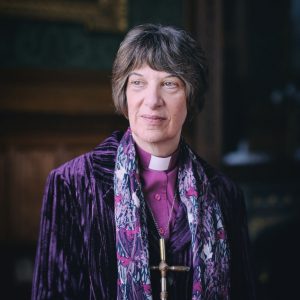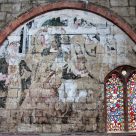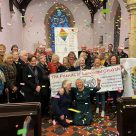 Easter Day: Gloucester Cathedral 2022
Easter Day: Gloucester Cathedral 2022
Early on the first day of the week, while it was still dark, Mary Magdalene came to the tomb and saw that the stone had been removed from the tomb. 2 So she ran and went to Simon Peter and the other disciple, the one whom Jesus loved, and said to them, “They have taken the Lord out of the tomb, and we do not know where they have laid him.” 3 Then Peter and the other disciple set out and went toward the tomb. 4 The two were running together, but the other disciple outran Peter and reached the tomb first. 5 He bent down to look in and saw the linen wrappings lying there, but he did not go in. 6 Then Simon Peter came, following him, and went into the tomb. He saw the linen wrappings lying there, 7 and the cloth that had been on Jesus’ head, not lying with the linen wrappings but rolled up in a place by itself. 8 Then the other disciple, who reached the tomb first, also went in, and he saw and believed; 9 for as yet they did not understand the scripture, that he must rise from the dead. 10 Then the disciples returned to their homes. 11 But Mary stood weeping outside the tomb. As she wept, she bent over to look[a] into the tomb; 12 and she saw two angels in white, sitting where the body of Jesus had been lying, one at the head and the other at the feet. 13 They said to her, “Woman, why are you weeping?” She said to them, “They have taken away my Lord, and I do not know where they have laid him.” 14 When she had said this, she turned around and saw Jesus standing there, but she did not know that it was Jesus. 15 Jesus said to her, “Woman, why are you weeping? Whom are you looking for?” Supposing him to be the gardener, she said to him, “Sir, if you have carried him away, tell me where you have laid him, and I will take him away.” 16 Jesus said to her, “Mary!” She turned and said to him in Hebrew, “Rabbouni!” (which means Teacher). 17 Jesus said to her, “Do not hold on to me, because I have not yet ascended to the Father. But go to my brothers and say to them, ‘I am ascending to my Father and your Father, to my God and your God.’” 18 Mary Magdalene went and announced to the disciples, “I have seen the Lord”; and she told them that he had said these things to her.
John 20:1-18
I wonder what difficult and challenging questions you have asked or heard this week. How can an unarmed black man, held face down, then be shot in the head by an armed police officer? Why can’t I better own my part in climate change as I see floods and fires and famine killing people in our world?
The news has of course been full of questions in the political arena, not least around immigration, parties, and truth and integrity. Questions which have provoked heart-searching and of course a plethora of answers and opinions from many different angles.
And then there have been all the many questions being asked around Putin’s horrific attack on Ukraine. ‘Why is this happening to us?’ is a question we have heard repeatedly in heart-wrenching media reports from Ukraine.
I confess I have also found myself repeatedly asking why it is that we are motivated to open our homes, raise funds and send aid to the people of Ukraine with a generosity and yearning which doesn’t seem to be as great when it comes to the people of so many other places in our world where there is also devastating suffering.
So many questions which point back to the brokenness of our world and draw us back to the mysteries of Holy Week.
Over these last few days I have been recalling my recent visit to Israel-Palestine: Being in the Garden of Gethsemane, walking down the Mount of Olives in silence, being at the possible sites of the crucifixion and of the empty tomb. And of course, so many questions bubble to the surface as you visit the places where Jesus walked and ministered on earth. On more than one occasion our wonderful guide told us to ‘Google it’ (other search engines are available)! And of course, there was frustration and bewilderment as the group grappled with the political questions as we met local people and heard their stories. As we stayed and travelled in the shadow of the wall of separation; as we visited a Palestinian refugee camp; and as I once again visited Yad Vashem, the Holocaust Remembrance Centre, the question of ‘Why’ was never far from my lips. Indeed that question feels raw amid the tensions and conflict in Jerusalem this weekend.
Our gospel reading takes us to Jerusalem as the Apostle John tells his narrative of the first Easter morning, and there is questioning and grappling with things that are not understood:
Mary Magdalene is distressed as she says to Simon Peter and John, and then to the angels, ‘They have taken the Lord from the tomb and we don’t know where they have laid him’. Then we are told that the disciples did not yet understand …
This is a situation of distress and confusion and perplexity. Something we are very familiar with in our lives and in our world.
And yet, into all this comes the presence of Jesus Christ, and questions which relate to the faithfulness and unchanging love of God: ‘Why are you weeping?’ says the risen Christ to Mary – The same question the angels have already put to her. The angels and the risen Christ ask a question from a different perspective – That of God whose love is stronger than the deepest darkness, even death itself.
And then Jesus speaks Mary’s name. In all the uncertainty and the questions swirling within Mary comes this anchor-point of being known and loved by the risen Christ as she now recognises him with overwhelming joy.
Last night there was a wonderful Easter Eve Vigil here at the Cathedral as we marked the coming of the Easter light and celebrated the night of Christ’s rising from the dead. During that service a number of young people and adults were baptised and confirmed as they publicly declared their desire to follow Christ, and in it all the speaking of their names was significant.
As Bishop Robert and I marked each candidate with the sign of the cross and laid our hands upon their head, we spoke their name, declaring to each unique and precious individual that “God has called you by name and made you His own”. For me, it is always a very poignant and holy moment.
I always say to those coming for confirmation that it is not the end of the journey as if now there are no questions about faith and they have it all sorted. Rather, it is an important landmark of decision to enter ever more deeply into the mystery of God’s love, forgiveness and calling – And the questions may well grow more profound as life’s journey continues.
When Mary recognises Jesus and begins to absorb the truth that he is risen from death, she must have had so many questions in her head and heart, but Jesus doesn’t offer Mary an explanation – He simply speaks her name, and reveals himself as the risen Christ – revealing God’s love and life, stronger than even death itself.
Then Jesus tells Mary to go to the disciples with a message that he is alive and is going to ascend to be with God the Father once again. I’m quite sure Mary didn’t understand but she went to the other disciples and told them what she had experienced and of her encounter with Jesus and what he had said to her. I suspect the disciples bombarded her with all sorts of questions: ‘What do you mean?’ ‘When is he ascending?’ ‘Why is he ascending?’ ‘How has he come back from the dead?’ Why did he appear to you, a woman, and not come here to us?’ ‘Are you sure?’
And I wonder if Mary reacted with words such as, ‘Don’t ask me, I’m only telling you what I’ve seen and heard.’ Just as there is so much we can’t explain about human love in relationships – the whys and wherefores of love and acceptance – so it is with God, but in so much greater measure, as God is holy and totally beyond us … and yet intimately close. Mystery indeed.
One of the places where I’ve been engaging with questions during Lent has been in schools, including a couple of Religious Studies lessons in secondary schools. And each time when I’ve been asked about my religion, I have exchanged that vocabulary for that of ‘relationship and encounter’. You can learn about religion, but ‘encounter and relationship’ with God is not something you can learn – it is a mystery to be lived. It is about saying yes to intimate personal relationship with God in Jesus Christ, and yet it is not private – it is always about interdependence and community, as followers of Christ are called to be the Body of Christ together, with the Holy Spirit at work within us and between us. And the questions will continue. Mystery.
This morning, amid the chocolate and eggs and Easter bunnies, and all that symbolises new life, my hope and prayer on this Easter day 2022 is that you will personally know the presence of Christ in new ways. God knows you and your story – the pain and struggle, the joy and the celebration – and offers us forgiveness and love more than we could ever imagine.
And perhaps this morning there are tears within you – whether tears of sadness, or bewilderment, or anger … or tears of joy, or gratitude, or… May we open ourselves to God and speak our thoughts and feelings, or pour out our confusion, as we tell Jesus Christ why we are weeping. And as you receive Christ in bread and wine may you hear the Son of God speak your name.
At the start of our service today we lit the Easter candle which was lit for the first time at the vigil last night. The small flame speaks of Christ’s light and love which will never be overcome by darkness or even death, however powerful or overwhelming or crushing the darkness might sometimes seem.
At the end of the service last night, each confirmation candidate was given a candle lit from that Easter candle, and we sent them out with the words ‘Shine as a light in the world to the glory of God’. Those words might just have easily been spoken by Jesus Christ to Mary.
Our first reading from Acts (10:34-43) recalled the words of Peter, now after Christ had ascended, proclaiming the truth about Jesus Christ and shining as a light in the world to the glory of God .. yet once one of the disciples who arrived at that empty tomb but did not understand. One of the disciples to whom Mary ran to tell what she had experienced.
If we have encountered the love of God in the risen Christ, through the power of the Holy Spirit within us, then as we go from here may we do so knowing that we are sent as Mary was, to be the presence of Christ in our world. – A world in which children, young people and adults are asking so many questions, amid uncertainty, confusion, anger, anxiety and frustration. You don’t need to have the answers – only a desire to share your story and speak of the mystery of Christ’s love, hope and life which you have encountered. May it be so. Amen.
I wish you a joyous and hope-filled Easter.
Rt Revd Rachel Treweek, Bishop of Gloucester














